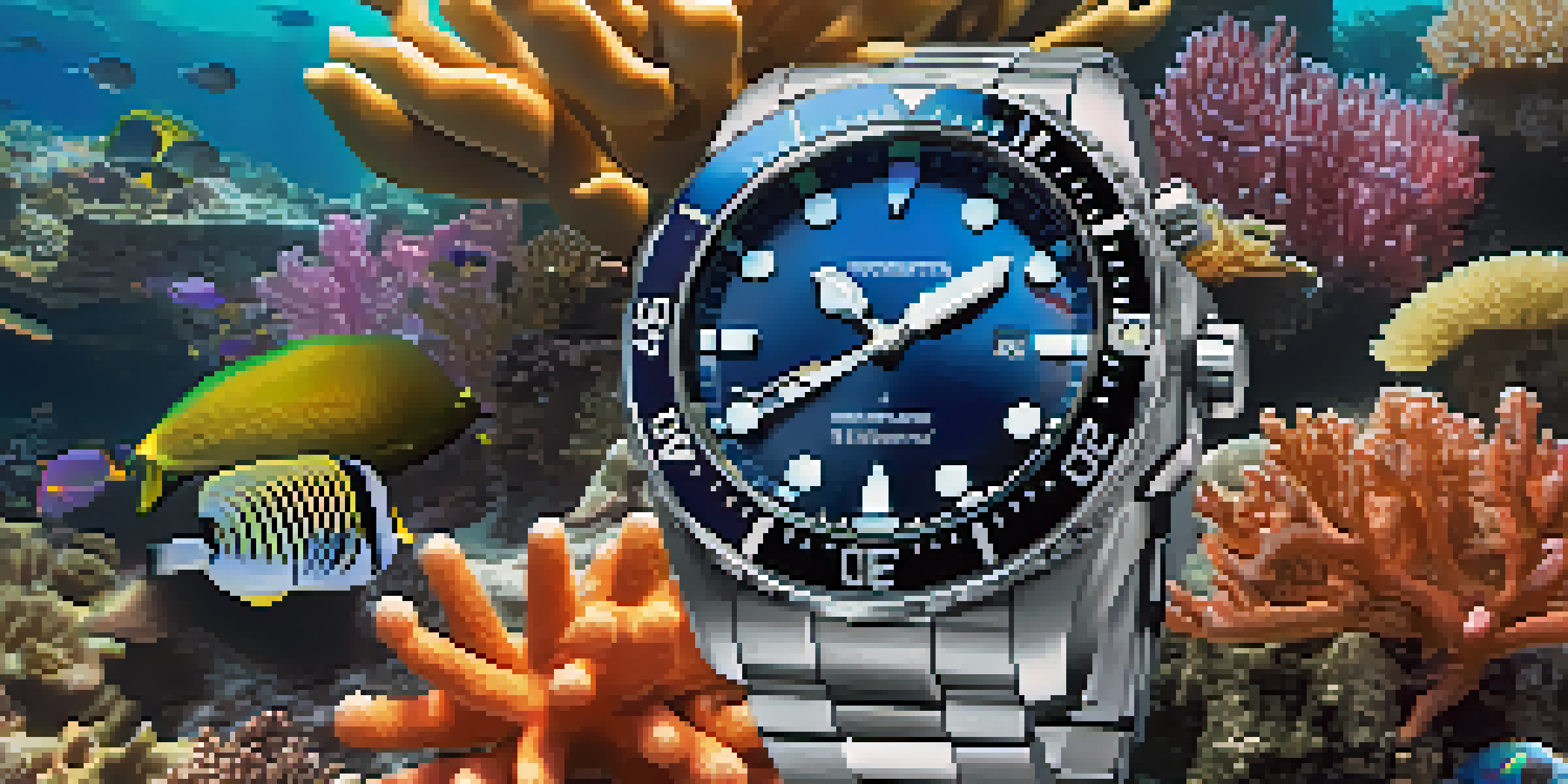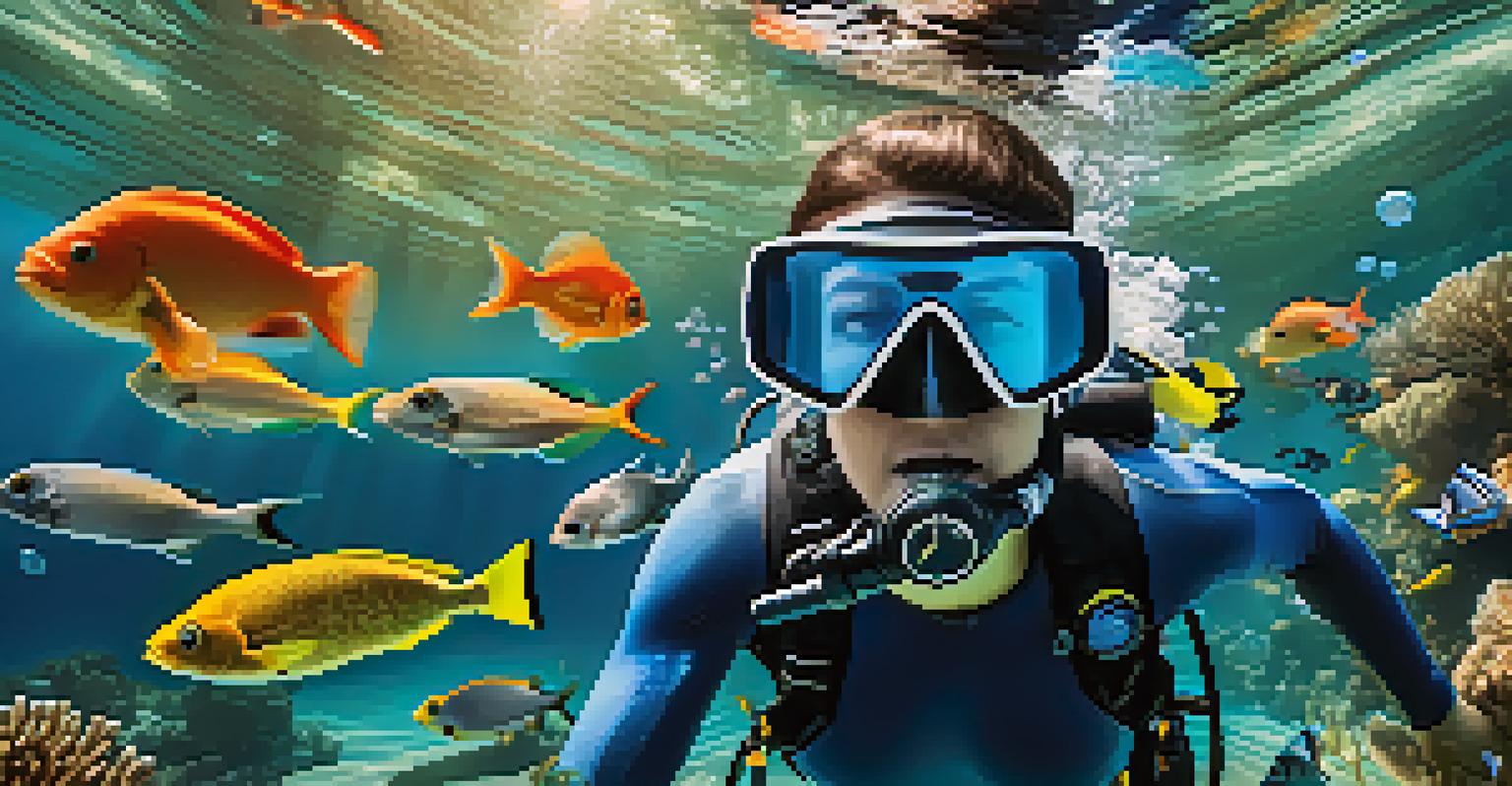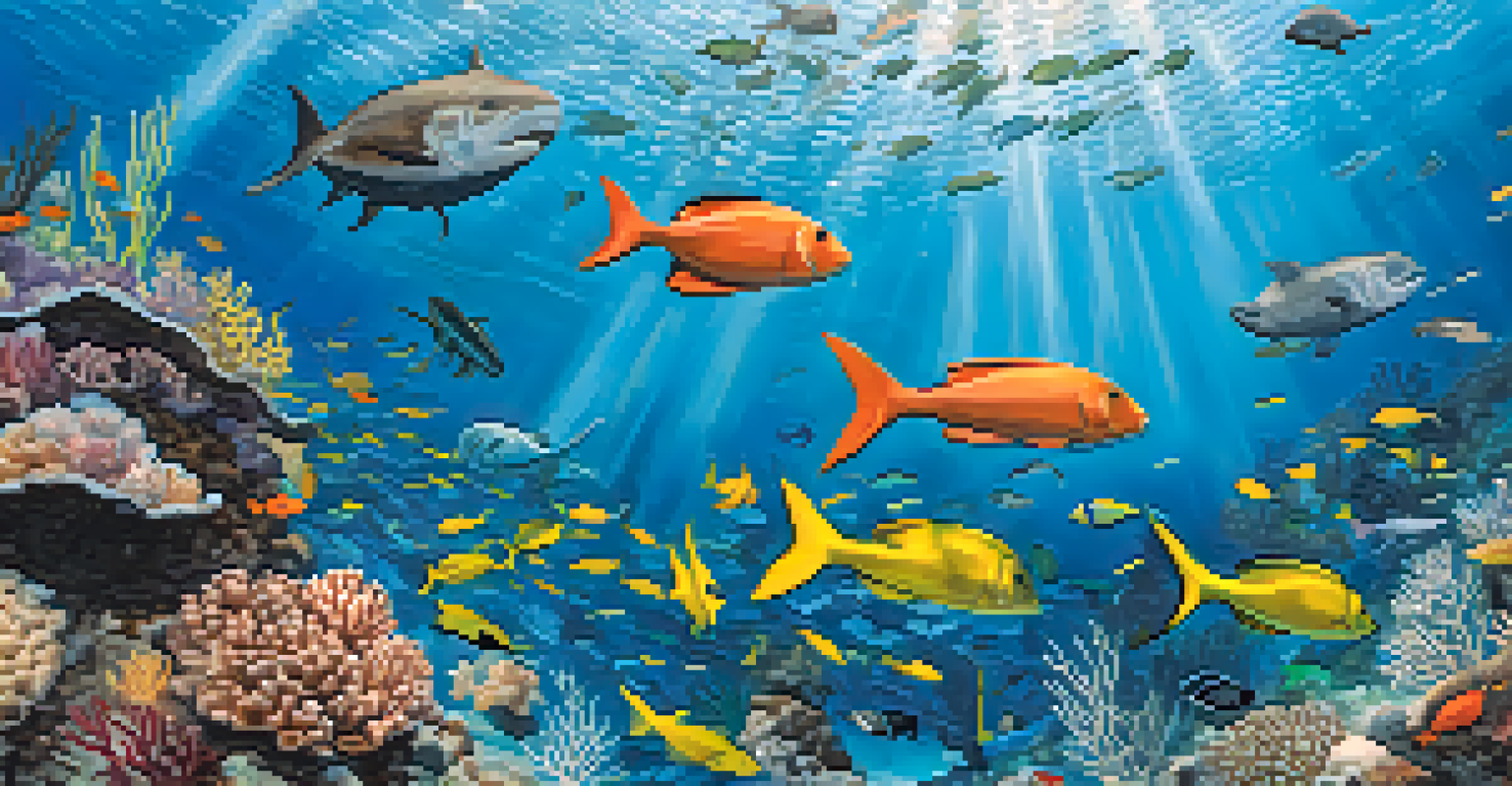The Future of Scuba Diving: Trends and Innovations

Emerging Technologies Revolutionizing Scuba Gear
As technology evolves, so does the gear we use for scuba diving. Innovative materials and smart technology are being integrated into wetsuits, fins, and dive computers, enhancing both safety and comfort. For example, the introduction of smart dive watches allows divers to track their depth, time, and decompression status in real time, making dives safer and more enjoyable.
The ocean stirs the heart, inspires the imagination, and brings eternal joy to the soul.
Moreover, advancements in underwater drones and cameras are enabling divers to document their experiences like never before. These tools not only capture stunning visuals but also offer a new level of interaction with marine life. Imagine exploring the ocean floor while your drone records every moment, allowing you to relive the adventure later.
With ongoing research and development, we can expect even more breakthroughs in scuba gear. Future innovations may include self-healing wetsuits or automatic buoyancy control systems, making the underwater experience more intuitive and accessible for divers at all skill levels.
The Rise of Eco-Conscious Diving Practices
As awareness of environmental issues grows, so does the movement toward eco-conscious diving. Divers are increasingly prioritizing sustainability, seeking out dive operators that promote conservation and responsible practices. This shift not only helps protect fragile marine ecosystems but also enhances the diver's experience, as they contribute positively to the ocean they love.

Organizations are now offering training programs focused on reef conservation and marine biology, allowing divers to deepen their understanding of the underwater world. By learning about the impact of their actions, divers can make informed choices that benefit marine life. For example, participating in coral restoration projects can transform a regular dive trip into a meaningful conservation effort.
Tech Innovations Enhance Diving Gear
Emerging technologies, such as smart dive watches and underwater drones, are revolutionizing scuba gear for improved safety and exploration.
Additionally, many dive operators are adopting eco-friendly practices, such as using biodegradable products and minimizing waste. This collective effort signifies a promising trend where diving and environmental stewardship go hand in hand, ensuring the oceans remain vibrant for future generations.
Virtual Reality: A New Training Frontier for Divers
Virtual reality (VR) is making waves in the scuba diving training arena, offering a safe and immersive way to learn essential skills. By simulating underwater environments, VR allows trainees to experience dive scenarios without the stress of real-life conditions. This technology can help build confidence and competence before entering the water.
We won't have a society if we destroy the environment.
For instance, VR training modules can simulate various underwater challenges, such as navigating currents or managing equipment malfunctions. Trainees receive instant feedback, enabling them to refine their techniques and improve their decision-making skills. This innovative approach not only enhances learning outcomes but also prepares divers for unexpected situations.
As VR technology becomes more accessible, we can expect its integration into dive schools worldwide. This could lead to a new generation of divers who are better equipped, more knowledgeable, and ready to explore the depths of the ocean with confidence.
Underwater Exploration: The Next Frontier
The future of scuba diving is also tied to the exploration of uncharted underwater territories. Advances in submersible technology and remote-operated vehicles (ROVs) are opening doors to previously unreachable depths. These innovations allow scientists and adventurers alike to discover new marine species and ecosystems, expanding our understanding of the ocean.
As researchers deploy ROVs to study deep-sea environments, divers can participate in these explorations, gaining firsthand experience in groundbreaking research. This collaboration between divers and scientists not only enhances the thrill of diving but also contributes to vital conservation efforts. For example, documenting new species can lead to more effective protection of their habitats.
Eco-Conscious Practices Gain Traction
Divers are increasingly embracing sustainable practices, prioritizing conservation efforts to protect fragile marine ecosystems.
With ongoing discoveries and the push to uncover the mysteries of the ocean, the role of divers will evolve. Future diving experiences may involve collaborative expeditions, where enthusiasts can contribute to significant scientific projects while enjoying the beauty of the underwater world.
The Growth of Dive Tourism and Its Impact
Dive tourism is on the rise, as more travelers seek unique experiences beneath the waves. This growing interest brings economic benefits to coastal communities but also raises questions about sustainability. Popular dive destinations must balance the influx of tourists with the preservation of their delicate ecosystems to ensure that diving remains an attractive option for future generations.
As divers become more conscious of their impact, there is a surge in demand for eco-friendly dive tourism options. Many operators are now offering sustainable dive packages that include conservation activities, such as reef clean-ups or wildlife monitoring. This allows divers to enjoy their adventures while actively contributing to the protection of marine environments.
Looking ahead, dive tourism will likely continue to evolve, with a focus on responsible practices. Sustainable diving experiences will attract a new wave of environmentally aware travelers, ensuring that the beauty of the underwater world can be enjoyed for years to come.
Marine Conservation Technology: A Game Changer
As the effects of climate change and pollution become more pronounced, marine conservation technology is gaining traction in the diving community. Tools like underwater sensors and satellite tracking systems are being employed to monitor marine ecosystems and track the health of coral reefs. This data is invaluable for scientists and conservationists working to protect our oceans.
Diving enthusiasts can also play a role in conservation efforts by participating in citizen science projects. By collecting data on marine species and habitats during their dives, divers contribute to vital research that informs conservation strategies. This collaborative approach empowers divers to be advocates for the ocean while enjoying their passion.
Wearable Tech Boosts Diving Safety
Wearable technology is improving safety in diving by providing real-time data and alerts to divers about their health and environmental conditions.
With the integration of conservation technology into diving practices, the future looks promising. Divers will not only explore the underwater world but also actively engage in its preservation, fostering a deeper connection to the environment they cherish.
The Impact of Wearable Tech on Diving Safety
Wearable technology is transforming how divers approach safety and monitoring during their underwater adventures. From smart dive computers to health-tracking devices, wearables provide real-time data that can enhance safety measures. These gadgets can alert divers to potential dangers, such as rapid ascent rates or insufficient oxygen levels, allowing for timely interventions.
For example, a smart dive watch can monitor your heart rate and environmental conditions, providing insights into your physical state while diving. This added layer of awareness can help divers make informed decisions and avoid risky situations. The integration of wearables into diving gear creates a more comprehensive approach to safety.

As wearable technology continues to advance, we can expect even more innovations tailored specifically for divers. These enhancements will not only improve safety but also elevate the overall diving experience, enabling divers to focus on the beauty of the underwater world.